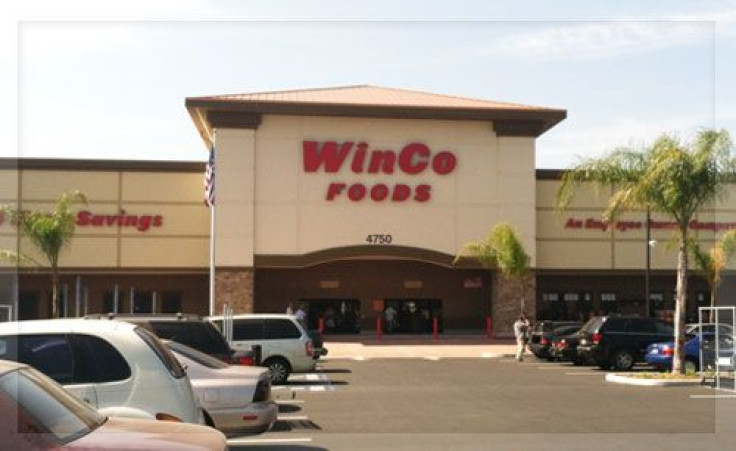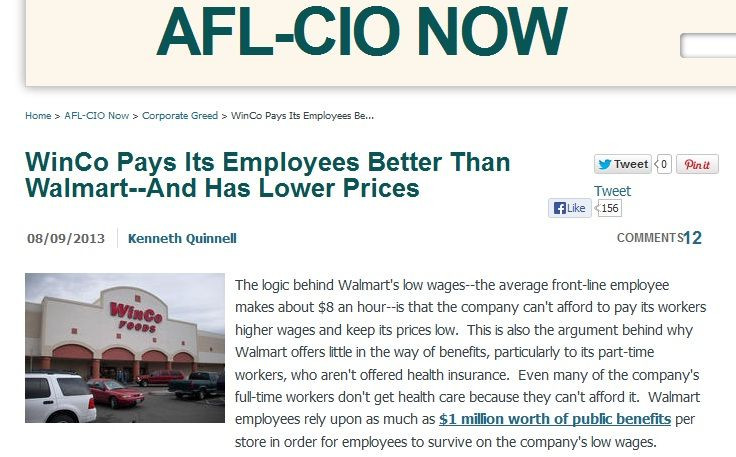Is WinCo Foods Anti-Union? AFL-CIO Praises Wal-Mart Competitor, Then Deletes Blog Post

Over the last week or so, WinCo Foods Inc. has been enjoying a wild ride of positive press. The rapidly growing, privately held supermarket chain is being touted as a more ethical competitor to Wal-Mart Stores Inc. (NYSE:WMT), the country’s largest retailer and a frequent target of the workers’ rights movement.
Posting celebratory memes and radiant acclaim, users across Facebook and Twitter are championing the Boise-based WinCo, holding it up as an example of a company that pays its employees better than Wal-Mart and yet still manages to keep its prices lower.
It’s a great story for anyone who cares about raising low wages and improving workers’ benefits, but is it true? Even the AFL-CIO, the country’s preeminent federation of trade unions and a fervent Wal-Mart critic, posted a glowing bit of praise for WinCo last week.
“[WinCo’s] higher wages and benefits have led to low turnover -- the average hourly worker stays with the company more than eight years -- which has led to better employee performance and customer satisfaction,” fawned Kenneth Quinnell, a senior writer for the AFL-CIO’s publications department, in a blog post.
But that post has since been deleted without explanation. In response to an inquiry, Quinnell told International Business Times that WinCo, in fact, has an anti-union stance.
“We’ve learned that WinCo discourages workers from organizing independent unions, which is why we removed the post,” he said in an email.

Quinnell did not respond to a request for more information, but, perhaps not coincidentally, the AFL-CIO recently teamed back up with United Food and Commercial Workers (UFCW) after an eight-year estrangement, during which time UFCW aligned with a rival federation. And as it turns out, WinCo has long been an enemy of food workers’ unions. In April 2011, for instance, the company met with picket lines when it opened a new location in Tacoma, Wash.
At the time, a post from WinCo’s Facebook page countered the protests, saying that its employees are part owners of the WinCo family, which offers greater rewards than being in an independent union.
“The people picketing don’t understand that WinCo is owned by the very people that work in the company, therefore we do not need a union to ‘protect’ us from the owners, because we are one and the same,” the post said.
WinCo’s employee stock-ownership model, part of its pension plan, is one of the aspects of the company that has fostered its sudden anti-Wal-Mart image, a narrative that originated with a July 23 article in the Idaho Statesman. In the story, the Statesman’s Audrey Dutton quoted Burt Flickinger III, a retail analyst who said that WinCo is the perhaps best retailer in the Western U.S.
“They’re Wal-Mart’s worst nightmare,” Flickinger told the Statesman.
Positive stories in Time, Business Insider, Daily Kos and elsewhere followed, all offering a glimmer of hope that the much-maligned retail giant could one day be toppled by a low-key company from Idaho.
But could criticism from prominent labor unions disrupt WinCo’s hero’s journey? Mike Read, WinCo’s spokesman, chuckled when he heard that the AFL-CIO deleted a pro-WinCo blog post, but he denied that WinCo discourages its employees from seeking union membership.
“We don’t encourage or discourage unionization,” he said in a phone interview. “Most of our employees don’t feel the need to want to do that, because their wages, benefits and pensions are better than the union, but we don’t discourage it.”
Read went on to say that WinCo does have a number of union contracts within the company, including some of its distribution workers and meat-department workers. But most employees, he said, operate under a self-formed “employee committee.”
“It’s better than any union pension plan that I’ve ever seen or heard of,” he said.
And what about all those claims of higher WinCo pay? The AFL-CIO’s blog post said that WinCo paid its front-line workers $11 an hour, compared to Wal-Mart’s $8 an hour. But neither retailer is very forthcoming about what its lowest-wage workers really take in. Read would only say that WinCo’s wages are based off prevailing wages in any particular area, which he said the company tries to meet or beat at least “a little bit.”
Kory Lundberg, a spokeswoman for Wal-Mart, said the company’s full-time employees earn an average of $12.78 an hour, but, as some critics have pointed out, that much-cited number excludes part-time workers, and factors in higher-paid department managers. Lundberg declined to comment on Wal-Mart’s wages compared to WinCo’s.
As it turns out, that $11-an-hour figure may have come from WinCo’s listing on Glassdoor, which compiles information from anonymous users.
Read said that WinCo opened its 88th store on Thursday. Compare that to Wal-Mart’s 4,000 plus, and the nightmare scenario that Flickinger described starts to seem more like a daydream. Even Read admitted that the comparison, based on size alone, is not really an accurate one.
“It’s nice to get good press, and it’s nice that people think well of us,” he said. “But I would say that Mr. Flickinger’s opinion is his opinion only.”
Size isn’t everything, of course. And when it comes to keeping prices down and workers happy, Read is more than willing to say that WinCo’s reputation is well-earned.
“We do treat our employee-owners well,” he said. “That demarcates us from many of our competitors.”
© Copyright IBTimes 2024. All rights reserved.












